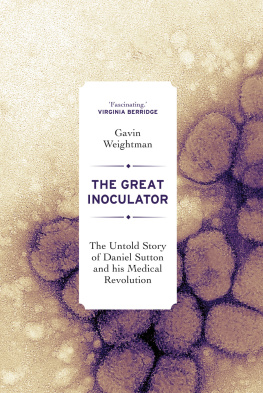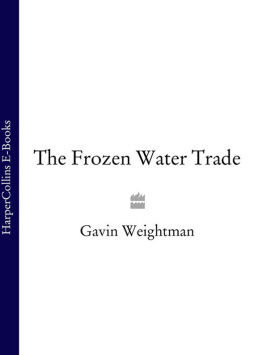THE GREAT INOCULATOR

Published with assistance from the Annie Burr Lewis Fund.
Copyright 2020 Gavin Weightman
All rights reserved. This book may not be reproduced in whole or in part, in any form (beyond that copying permitted by Sections 107 and 108 of the U.S. Copyright Law and except by reviewers for the public press) without written permission from the publishers.
For information about this and other Yale University Press publications, please contact:
U.S. Office:
Europe Office:
Set in Minion Pro by IDSUK (DataConnection) Ltd
Printed in Great Britain by TJ International Ltd, Padstow, Cornwall
Library of Congress Control Number: 2020938180
ISBN 978-0-300-24144-0
A catalogue record for this book is available from the British Library.
10 9 8 7 6 5 4 3 2 1
Contents
Plates
Acknowledgements
Dr Peter Razzell first drew my attention to the remarkable success Daniel Sutton and his family of Suffolk country surgeons had as inoculators against smallpox, the deadliest of all eighteenth-century diseases. Peter was struck by the fact that this was one medical intervention that might possibly have had a measurable part to play in the rise in population in the second half of the eighteenth century. Whether it was or not, and that question is unresolved, Peters research revealed the largely forgotten history of the origins of what later became known as vaccination. It is a subject he and I discussed many times and which, in the end, inspired this book which is dedicated to him.
I am also greatly indebted to John Smith, author of The Speckled Monster, a history of smallpox in England with special reference to Essex. My thanks to Lord Rayleigh, and to John for transcribing the letters for me.
Michael Bennett, Emeritus Professor of History and Classics at the University of Tasmania, generously shared his wealth of knowledge about inoculation and vaccination with me and allowed me to read some of his recent unpublished work. Professor Bennetts account of the extraordinary career of Daniel Suttons father-in-law Simeon Worlock opened up a chapter about which very little is known in this country. I am very grateful to him for all the help he gave me.
I discussed the life and influence of Sutton with a number of historians of medicine in the eighteenth century, notably Gareth Williams, Emeritus Professor of Medicine and Dentistry at Bristol University. Daniel Suttons influence was discussed in Sally Irvines 2011 East Anglia University PhD thesis on Suffolk apothecaries and surgeons and she kindly pointed me in the direction of some useful research. Rosemary Leadbetters Oxford Brooks University thesis Experiencing Smallpox in Eighteenth Century England provided valuable background information and she was kind enough to discuss her view on the Suttons.
Although eighteenth-century inoculators had no idea their success depended on stimulation of the human immune system, I thought it worth enquiring of contemporary specialists whether anything Sutton discovered might suggest he had an intuitive insight into the way in which the body fights invasive infections. I am grateful to Professor Sheena Cruickshank, Academic Lead for Public Engagement in the Lydia Becker Institute of Immunology and Inflammation at the University of Manchester for taking the time to make an assessment of Suttons attempts at medical research as described in his book The Inoculator. The best that can be said is that his results were inconclusive and that he got no further than his eminent medical contemporaries in understanding the nature of smallpox. He was, simply, a brilliant empiric.
I would like to thank the staff of the London Library who were very helpful as always. So too the staff of the British Library, the Wellcome Library and the Essex Record Office for their assistance with my research. Estela Dukan in the library of the Royal College of Physicians of Edinburgh kindly sent me documents from the archive of Sir John Pringle, an admirer of Daniel Sutton.
Lastly I would like to thank Heather McCallum, who first suggested I write a book about Sutton, and Marika Lysandrou and Clarissa Sutherland at Yale University Press for seeing the book through to publication. Thanks to Sophie Richmond for her meticulous editing. Finally I would like to thank Charles Walker of United Agents for looking after my interests as always.
Preface
You will not have heard of Daniel Sutton, an eighteenth-century country surgeon, whose reputed ability to tame the most feared disease of the age won him international fame and fortune. Sutton deserves an epitaph not simply because he had undoubted success in combating illness in the heyday of medical quackery. His pioneering practice, in which he specialised in rendering patients immune to smallpox, paved the way for what later became known as vaccination. That innovation, introduced by Edward Jenner, was a worldwide sensation which had him later cast as the the father of immunology. Jenners fame condemned Sutton to obscurity. The Great Inoculator seeks to give an eighteenth-century medical revolutionary his due and to put the more famous Jenner in his place.
In Suttons lifetime, and long after his death in 1819, medicine knew nothing of the causes of infectious diseases. Sutton himself admitted this ignorance and speculated, correctly, that until more powerful microscopes were made, which could detect minute organisms, the cause of smallpox would remain a mystery. Germs were first identified as the cause of disease in the 1860s. This raises a question about the legitimacy of claiming that Daniel Sutton was a medical revolutionary. We are accustomed today to believe that any medical breakthrough is a result of sophisticated scientific research. Much of it is, but there has always been a place for astute observation in the advancement of medical understanding.
This is accepted in the case of Edward Jenners discovery. He knew no more about the nature of infectious diseases than any other eighteenth-century doctor. His breakthrough came with the guess that a pox less virulent than smallpox that sometimes infected cattle could be used to protect against the human disease. Jenner invented a Latin name for cowpox which means, in effect, smallpox of the cow: variolae vaccinae. Very soon Jenners inoculations became known as vaccination in competition with Daniel Suttons variolation, in which smallpox infection itself was used for inoculation. The rivalry continued after the death of both of them until, in 1840, Suttonian inoculation was outlawed by Parliament.
It is almost impossible now to evoke for a modern readership the horrors of a smallpox epidemic. The affliction itself, in its most severe form, covered the victim from head to toe in horrid pustules which burned and then suppurated. This was what was called confluent smallpox and few survived such an attack. Infants and small children were especially vulnerable, but it was thought that almost everyone in the eighteenth century was attacked by smallpox at some time in their lives. Some were lucky and got off lightly. Many others were disfigured, their faces scarred, beauty obliterated.
In his The History of England from the Accession of James II T.B. Macaulay wrote:
The smallpox was always present, filling the churchyards with corpses, tormenting with constant fears all whom it had stricken, leaving on those whose lives it spared the hideous traces of its power, turning the babe into a changeling at which the mother shuddered, and making the eyes and cheeks of the bighearted maiden objects of horror to the lover.
Throughout the eighteenth century, newspapers were full of advertisements for potions which might alleviate the horrors of smallpox. There was no cure: an epidemic simply had to be endured. Each visitation of the disease in the towns and villages of Britain could spell economic disaster. Nobody wanted to come to market where smallpox was rife and the inns and shops might be deserted for weeks. When the danger had passed, the all-clear would be advertised in newspapers so that trade might resume as soon as possible.
Next page










